| Reviews & Columns |
|
Reviews DVD TV on DVD Blu-ray 4K UHD International DVDs In Theaters Reviews by Studio Video Games Features Collector Series DVDs Easter Egg Database Interviews DVD Talk Radio Feature Articles Columns Anime Talk DVD Savant Horror DVDs The M.O.D. Squad Art House HD Talk Silent DVD
|
DVD Talk Forum |
|
|
| Resources |
|
DVD Price Search Customer Service #'s RCE Info Links |
|
Columns
|
|
|
That Obscure Object of Desire
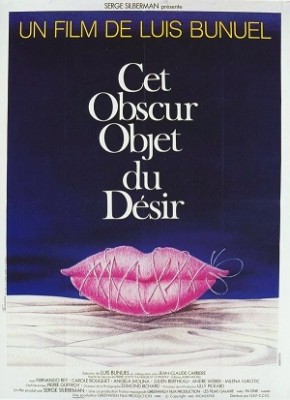
Please Note: The images used here are taken from promotional images and from stills provided by StudioCanal, not the Blu-ray edition under review.
The great Spanish filmmaker Luis Bunuel, who had worked in the U.S., Mexico, and France as well as in his homeland since the silent era, experienced the last of his multiple transformations/rebirths in France in the '60s and '70s. With his final film, 1977's That Obscure Object of Desire, he ended a run of bourgeois-baiting, surrealist comedy-dramas that he'd kicked off in '67 with his rightly legendary Belle de Jour (and reached a career apex with in the form of The Discreet Charm of the Bourgeoisie in 1972). Collaborating one more time with the storied scripter Jean-Claude Carrière (his cowriter on every one of these French films, also including The Milky Way (1969) and The Phantom of Liberty (1974)), Bunuel caps his decades-long career with one last light yet deadly poke at the comically thick, blind self-involvement to which us human beings are so unfortunately susceptible (the more socially well-acclimated and affluent, the more deluded, seems to be Bunuel's general rule) and the rank hypocrisies of institutions (the (Catholic) church, governments, social hierarchies, marriage, various political factions), combining a classical "love" story of the most genteel and melodramatic variety with up-to-the-minute contemporary sociopolitical trouble spots for a strange, intoxicating brew mixed together and cooked up to a highly entertaining, frequently hilarious state in which its seemingly incompatible ingredients robustly bring out all the juicy, irreverent, thought-provoking flavors in one another.
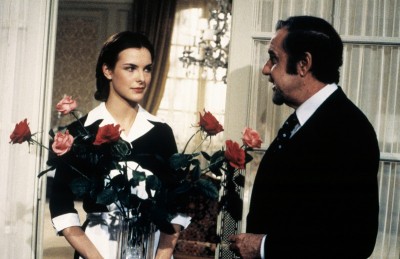
The film is "based" upon (which is to say, it riffs with calm and confident disrespect on) a late-19th-century novel by Pierre Louÿs -- the same one Sternberg used for The Devil is a Woman. An idle-rich older gentleman, Mathieu (Fernando Rey), after coldly, rudely dumping water over a beautiful lady who's attempted to join him on a departing train, regales his fellow passengers with the story of his long, twisted pursuit of this woman, whom he now describes to them as "the most foul on earth." In flashback, we learn that his long-running paramour/thorn in the side, Conchita (played by turns, in unpredictable alternation, by Carole Bouquet and Angela Molina), whom he first met as a servant girl to one of his well-connected friends, is the rabbit to his Alice, a virginal super-tease who has led him well into subterranean/subconscious territory; dragged him through the poor, seedy districts where she lives with her widowed, overprotective mother and sometimes dances for money; subjected him to her cadre of criminal friends (are she and her enviably young and handsome, shady pals somehow involved in the political terrorism always lurking at the film's periphery?); disappeared for months on end, sometimes leading him to track her down in different cities in different regions altogether; and generally exploited his jealousy, taken and/or refused on an indifferent whim his all-too-readily offered money, and gleefully humiliated him, allowing Mathieu to get close, nearly intimate, then pulling away, putting off any physical consummation of their love until the next time, and the next.
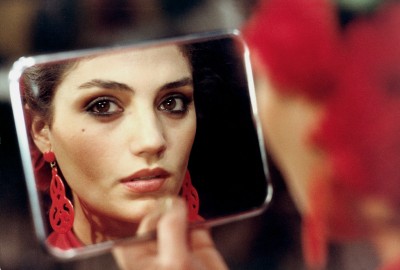
Mathieu's discreet upper-class respectability can't allow his obsessively hyper-romantic notions to be deflated by the cold truth that he's more or less a john, Conchita's propriety-exuding, piously religious mother his even more discreet, double-speaking procurer, and the virginal, sexually beyond-reluctant Conchita herself a pawn trapped between the two image-cultivating hypocrites; on a deeper level, "Conchita" actually needs those quotes, so archetypically, generally "feminine" is she, less an individual than a spectre trumped up by Mathieu's libidinous, increasingly pathetic imagination into something as maddening, inscrutable, and treacherous as she is worth pursuing to the ends of the earth, forsaking pride and all other concerns in the process. Meanwhile, if his all-consuming, lusted-after "obscure object" is at least something of an illusion (a projection at best, an impression cleverly and effectively reinforced by the interchangeability of the two women playing Conchita, coupled with his blissful ignorance that she's frequently not at all the same person, physically speaking), the ever-closer encroachment of real-world problems (the aforementioned violent terrorism, at the hands of the very Bunuelian "Revolutionary Army of the Infant Jesus," in the forms of car bombs and shooting in the streets; the economic disparity that has placed him and Conchita on such far-opposite sides of a social divide) upon his solipsistic bubble of chamber drama suggests that the false vacuum he lives in extends much further and deeper than his love life. When he departs the train at the end, and an exceedingly unlikely reunion and reconciliation with Conchita (who's boarded the train anyway, and gotten hold of a water pail to give him his comeuppance) makes it seem Mathieu's straight-from-a-novel romantic idealizations will come to pass after all, Bunuel and Carrière abruptly bring things much fuller-circle than that, with an explosive conclusion that exhilarates with its audacity and far-reaching sense of simultaneous cosmic absurdity and justice.
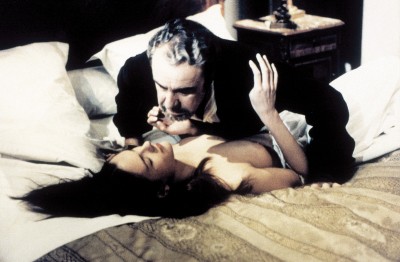
Bunuel's style -- which never fails to surprise me with its casual restraint, its pretty, gracefully simple, but rather utilitarian and never hyper-artificial or strivingly beautiful look -- here, as throughout his best works, derives its supremely deadpan, slyly lacerating quality from how careful and craftsmanlike it is, how it never calls attention to itself or becomes self-conscious or over-demonstrative when it comes to the bizarre interactions, events, and plots the director has concocted. It's no wonder Bunuel never much cared for René Ferracci's classic poster designs for Obscure Object, The Phantom of Liberty, and, most famously, the "lips on legs" image for The Discreet Charm of the Bourgeoisie; their gaudily colorful, self-aware "surrealist" juxtapositions, beautiful and symbolically accurate as they are, don't really represent the manner in which the Bunuel/Carrière collaborations arrive at their less self-announcing, more potent surrealism. Bunuel's genius is in bringing straightforward, very fluent but decidedly traditional/classical visual storytelling strategies (the segues and transitions carried out by editor Hélène Plemiannikov never purposely jarring, even when the story might seem to demand it; DP Edmond Richard nicely but never ornately or too-remarkably lighting each scene, always ably but never showily choreographing the camera with the action) to the films' anti-traditional, anti-realist, irrational twists, and to the anti-psychology in the handling of characters that finds their emotions and actions veering from slapstick to vicious to melancholy and back again, often in the same scene.
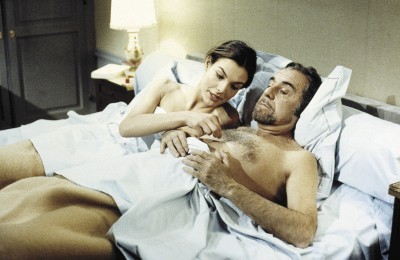
Bunuel was, and remains famous for being, one of the original surrealists, and his films serve as well-grounded reminders that the term hardly signifies "quirk" or gaudy exaggeration; "sur" simply means "over and above," "more than," hence the unlikely, incongruous, but absolutely apt trappings of realism to which Bunuel meticulously, craftily adheres as he thwarts all the plausibility, rationality, and logic demanded by the more staid, non-sur type of realism. There's something consistently very funny and just as often quite disturbing, something that demands a second and third look, to how too-real Bunuel's great films are, how both the characters and the way they're presented to us come across so implacably convinced of the plausibility of their warped reality, never winking or nudging or letting their unexcited, unhurried mask crack in any way that would disturb Bunuel's poker-faced mockery of any and all "common-sense" convention, be it social, political, or artistic. As exemplified beautifully in this last, masterfully realized testament to Bunuel's extremely intelligent search for comedy in all the "wrong" places (and unexpectedly touching human-nature insights in the most unlikely ones), his was a quiet, modest (at least on the surface) kind of rebellion and nonconformity, but certainly no less effective, in fact much more so, for never patting itself on the back and thereby giving the game way. The liberation thus held out for the pleasurable grasping by That Obscure Object of Desire, as by all of his best work, offers its own secret but smooth, accessible path to non-prescriptive, humane and peaceful utopia; the exhilaration they allow, of seeing right through any dogma or imposed, unquestioned "common-sense" notions in circulation -- the way they expose not just the immoral hypocrisy but the laughable, patent absurdity of all the violence and cruelty to which what's thought of as common-sense, normal life, love, and art leads us -- is louder than bombs.
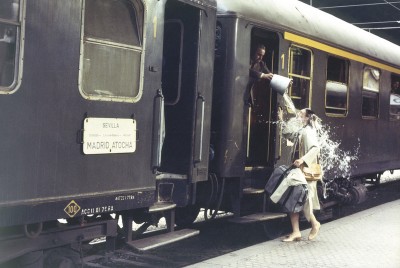
THE BLU-RAY DISC:
The AVC/MPEG-4/1080p transfer, which preserves the original theatrical aspect ratio of 1.66:1, is very nice-looking; a comparison to the prior DVD edition shows that it is a vast, vast improvement, with beautifully solid and vibrant colors and infinitely less noise and edge enhancement. It's almost too good: The smoothness of the image might lead one to suspect that digital noise reduction (DNR) was too liberally applied, but close scrutiny reveals no telltale haloing due to edge enhancement, and a fine film grain still for the most part discernible throughout, with at least some of the celluloid texture preserved in every scene. The bottom line: Even if the transfer isn't entirely as authentic/film-like as it could have been, it's a huge improvement, by far the best we've ever seen this film on home video.
Sound:The film's modest soundtrack is done full justice by the DTS-HD Master Audio 2.0 track (in French with optional English subtitles), with all music, dialogue, and sound effects (the syncopated percussiveness of Conchita's dancing shoes, for example) sharp, clear, vivid, and immediate, and no instances of hiss, crackle, or any other distortions or imbalances in the mix. The film's sound is quite simple and basic on the terms of ultra-surround technology, but it all sounds pristine and as full as intended in this very well-done audio presentation.
Extras:--A 12-minute interview with Spanish filmmaker Carlos Saura (The Flamenco Trilogy, who knew Bunuel personally. Here, he recalls his colleague's return to Spain in the '60s and what he was like in daily life as a person and friend; the directors' mutual admiration for one another; and the relationship of Bunuel's work to classic Spanish literature, among other things.
--"The Arbitrariness of Desire," a 35-minute interview with legendary European screenwriter/collaborator Jean-Claude Carrière, who delves deep into his long-running working relationship with Bunuel to come up with a bounty of insights into the director as both a man and an artist, along with some fascinating, revelatory anecdotes focusing on their joint writing habits, particularly on That Obscure Object of Desire (though perhaps the most memorable recollection is of a party, hosted by George Cukor and attended by Carrière, Bunuel, William Wyler, and Hitchcock, during which Hitchcock was full of uncharacteristically effusive praise for Bunuel's Tristana).
--"Lady Doubles," a 38-minute cross-cutting of interviews with the two women -- Carole Bouquet and Angela Molina -- who play Conchita in the film, each of whom recalls the surprisingly close friendship that developed between them, their respective experiences of working with Bunuel, and the uniquely nerve-wracking and exhilarating casting process (each thought, until learning both were to be cast, that they were in competition with the other for a role originally meant to be played by a sole actress, namely Maria Schneider, who proved to be incompatible with the project once shooting began).
--"Portrait of an Impatient Filmmaker," an interview with That Obscure Object of Desire's assistant director, Pierre Lary, and its DP, Edmond Richard (a frequent Bunuel cinematographer), who give the furthest insights into Schneider's difficulties and eventual parting with the film, as well as Bunuel's personality (painstakingly polite, but, as the title of the piece suggests, impatient; he simply hated to wait when he was ready to go, which both Lary and Richard remind us is quite a stressful attribute in a director for ADs and DPs on a film set, with its sometimes long, complicated setup times).
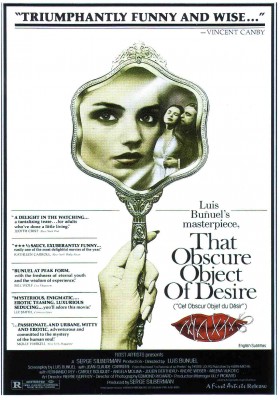
Luis Bunuel's final film makes a perfect coda for a career packed with provocations that always have had more staying power than the controversy and scandal that greeted them. As anyone would've expected from Bunuel, That Obscure Object of Desire takes on sex, the Church, and bourgeois propriety, and it nests all these touchy matters within the (then) more novel sore spot of bomb-planting, plane-hijacking terrorism, with a "traditional" love story between an obsessed older man (Bunuel stalwart Fernando Rey) and a beautiful young woman (played by two actresses, the fire-and-ice duo of Angela Molina and Carole Bouquet, alternated with apparent nonchalant randomness) as the site where all those perennially hot topics meet to have their absurdity revealed. This Bunuel does, as usual, without a trace of winking emphasis or exaggeration (either in performances or in filming style, which is always surprisingly classical, always fluent and adept but plainspoken and restrained); subtlety and garishness collude and combine in this master's films in a way that gives birth to a sublimity so unique you could call it (with all respect to Lubitsch) "the Bunuel touch." The ridiculous, sometimes heartbreakingly pathetic lengths that this falsely proud, wealthy old lecher will go to for his obsessive love/lust; his blindness to his "object" as anything other than conceptual prey to be captured (he never even notices she's often quite literally a different person from one meeting to the next); and the backdrop of ever-closer danger and chaos against which his quixotic quest plays out, all unfold naturalistically, no matter the crazy, humiliating, "unrealistic" extremes to which the situation degenerates. The aura of intermittent sudden violence and the film's explosive ending call into question this contentious but solipsistic couple's blithe, unspoken but obvious assumption that their self-styled drama is central, the guns and bombs mere background noise, and not the other way around. It's a roundabout, very comically entertaining way of incontrovertibly insinuating (never preaching; Bunuel doesn't do that) that the personal is the political, and if you're sheltered from that fact, well, it's only a matter of time before the rapidly progressing incineration of the world intrudes upon your life's seemingly urgent dramas to remind you, and in the meantime, your dead-serious self-interest is funnier than you think. It is a comedy, after all, albeit an unusually rich, creative, and disturbing one; for Bunuel, tearing off the veils and revealing the self-undermining hypocrisy of any version of "normality" or "common sense" you've ever heard of (or been indoctrinated with) is more than half the fun, and on that note, That Obscure Object of Desire stands out in the memory at least as much for its deadpan-incisive mockeries -- its metaphorical explosiveness, in terms of laughter and irreverent provocation -- as for the lit fuse of sociopolitical realization it sneakily plants in your mind before running for cover. Highly Recommended.
|
| Popular Reviews |
| Sponsored Links |
|
|
| Sponsored Links |
|
|
| Release List | Reviews | Shop | Newsletter | Forum | DVD Giveaways | Blu-Ray | Advertise |
|
Copyright 2024 DVDTalk.com All Rights Reserved. Legal Info, Privacy Policy, Terms of Use,
Manage Preferences,
Your Privacy Choices | |||||||











